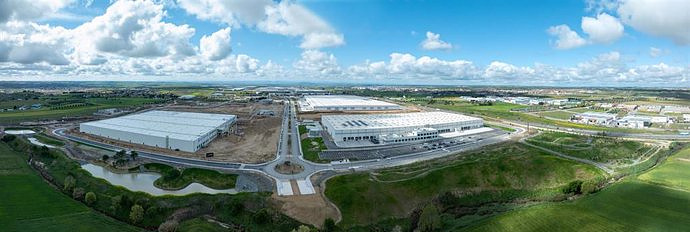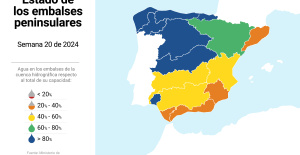42.9% do not believe that AI will destroy jobs in the medium term and 22% quantify the reduction of jobs below 10%
MADRID, 17 Mar. (EUROPA PRESS) -
Experts and managers of the PwC Economic and Business Consensus predict growth in the Spanish economy this year of 1.7%, one tenth more than their previous estimates, and project a boost to the Gross Domestic Product (GDP) in 2025 of 1. 9%.
This is predicted by the Economic and Business Consensus, corresponding to the first quarter of the year, which PwC has prepared since 1999, based on the opinion of a panel of 450 experts, businessmen and managers. This survey, however, was carried out before knowing the new forecasts of the Bank of Spain, which point to an increase in GDP this year of 1.9% and 2% in 2025.
The Consensus reflects a change in the opinion of the panelists about the economic situation and an abandonment of the pessimistic positions of the end of last year. Those who rate the current moment as good grow from 32.6% to 45.9% and those who expect this situation to be better or the same in the second quarter of 2024 increase to above 70%. For next year, 82 % estimates that activity will have an increase similar to this year.
However, if the average of the opinions of the panelists is taken, their forecasts point to GDP growth of 1.7% in 2024, and 1.9% in 2025.
Behind these projections is the expected lowering of interest rates by the ECB. 53% of experts, managers and businessmen expect between three and four drops of 0.25 points between now and June 2025, when they believe that the price of money will go from the current 4.5% to below 3.5 %.
Of course, as long as inflation continues to show signs of weakening and the ECB perceives the need to combat the recession in Germany. In this sense, the panelists believe that inflation in Spain will close 2024 at 2.5%.
Despite this significant improvement in growth expectations, experts, businessmen and managers consider that there are still two problems why they do not produce more or the economy does not increase more.
On the one hand, 56.1% consider that the expected demand is not enough to increase production, while 32% believe that the necessary qualified workers are not available.
Regarding the situation of the families, only 28% believe that it is good and the majority (66%) estimate that it is average and that it will continue that way for the next six months.
In this context, consumption will remain stable for 64% of those surveyed, while housing demand will experience a slight improvement: those who expect it will decrease fall from 74.7% to 40%.
Regarding the economic-financial situation of the companies, 52% rate it as good and 48% as average. Nobody says it's bad. And for the next quarter, 73% expect everything to remain the same.
There is also a shift towards more optimistic opinions than in the Consensus at the end of the year regarding the evolution of productive investment, exports and job creation.
The Economic and Business Consensus, corresponding to the first quarter of 2024, is dedicated to knowing the opinion of experts, businessmen and managers on generative Artificial Intelligence and its impact on the labor market.
From their responses it is clear that, despite being present in all the debates, its practical application is still "in infancy", at least, in Spain. Of course, a large majority (77.2%) believe that it will have a great impact on productivity and 65.3% on the labor market. On the contrary, it will not significantly affect social equity.
80.4% do not believe that AI could put the viability of companies at risk, and the opinion shared by 59.8% of those surveyed is that it will have a significant impact on some of the specific areas of companies. but its scope is yet to be determined. Only 14.4% believe that it will completely revolutionize their business.
Furthermore, the opinion of 42.9% of those surveyed is that it will not lead to job destruction in the medium term, while 22% quantify the reduction in jobs to below 10%.
As for whether this technology will create new jobs, 53.1% are unsure and believe that AI will transform the nature of certain jobs and cause a reconfiguration of the workforce.

 Exploring Cardano: Inner Workings and Advantages of this Cryptocurrency
Exploring Cardano: Inner Workings and Advantages of this Cryptocurrency Seville.- Economy.- Innova.- STSA inaugurates its new painting and sealing hangar in San Pablo, for 18 million
Seville.- Economy.- Innova.- STSA inaugurates its new painting and sealing hangar in San Pablo, for 18 million Innova.- More than 300 volunteers join the Andalucía Compromiso Digital network in one month to facilitate access to ICT
Innova.- More than 300 volunteers join the Andalucía Compromiso Digital network in one month to facilitate access to ICT Innova.-AMP.- Ayesa acquires 51% of Sadiel, which will create new technological engineering products and expand markets
Innova.-AMP.- Ayesa acquires 51% of Sadiel, which will create new technological engineering products and expand markets Putin begins his fifth term demanding the "security" and "unity" of Russia
Putin begins his fifth term demanding the "security" and "unity" of Russia Almeida points to the death of two workers after being trapped under an 8-ton slab in Madrid
Almeida points to the death of two workers after being trapped under an 8-ton slab in Madrid Armengol and two former senior officials from the Balearic Islands, summoned by the Congressional commission on masks
Armengol and two former senior officials from the Balearic Islands, summoned by the Congressional commission on masks Puente assures that if he had known the impact of his words on Milei he would not have said them
Puente assures that if he had known the impact of his words on Milei he would not have said them How Blockchain in being used to shape the future
How Blockchain in being used to shape the future Not just BTC and ETH: Here Are Some More Interesting Coins Worth Focusing on
Not just BTC and ETH: Here Are Some More Interesting Coins Worth Focusing on They develop devices for the precise diagnosis of cancer patients
They develop devices for the precise diagnosis of cancer patients UMH researchers are working on a high-quality apricot crop that requires less irrigation water
UMH researchers are working on a high-quality apricot crop that requires less irrigation water The UPV develops an application to improve the quality of life of patients with glioblastoma
The UPV develops an application to improve the quality of life of patients with glioblastoma A sensor system obtains the fingerprint of essential oils and detects if they have been adulterated
A sensor system obtains the fingerprint of essential oils and detects if they have been adulterated A million people demonstrate in France against Macron's pension reform
A million people demonstrate in France against Macron's pension reform Russia launches several missiles against "critical infrastructure" in the city of Zaporizhia
Russia launches several missiles against "critical infrastructure" in the city of Zaporizhia A "procession" remembers the dead of the Calabria shipwreck as bodies continue to wash up on the shore
A "procession" remembers the dead of the Calabria shipwreck as bodies continue to wash up on the shore Prison sentences handed down for three prominent Hong Kong pro-democracy activists
Prison sentences handed down for three prominent Hong Kong pro-democracy activists ETH continues to leave trading platforms, Ethereum balance on exchanges lowest in 3 years
ETH continues to leave trading platforms, Ethereum balance on exchanges lowest in 3 years Investors invest $450 million in Consensys, Ethereum incubator now valued at $7 billion
Investors invest $450 million in Consensys, Ethereum incubator now valued at $7 billion Alchemy Integrates Ethereum L2 Product Starknet to Enhance Web3 Scalability at a Price 100x Lower Than L1 Fees
Alchemy Integrates Ethereum L2 Product Starknet to Enhance Web3 Scalability at a Price 100x Lower Than L1 Fees Mining Report: Bitcoin's Electricity Consumption Declines by 25% in Q1 2022
Mining Report: Bitcoin's Electricity Consumption Declines by 25% in Q1 2022 Oil-to-Bitcoin Mining Firm Crusoe Energy Systems Raised $505 Million
Oil-to-Bitcoin Mining Firm Crusoe Energy Systems Raised $505 Million Microbt reveals the latest Bitcoin mining rigs -- Machines produce up to 126 TH/s with custom 5nm chip design
Microbt reveals the latest Bitcoin mining rigs -- Machines produce up to 126 TH/s with custom 5nm chip design Bitcoin's Mining Difficulty Hits a Lifetime High, With More Than 90% of BTC Supply Issued
Bitcoin's Mining Difficulty Hits a Lifetime High, With More Than 90% of BTC Supply Issued The Biggest Movers are Near, EOS, and RUNE during Friday's Selloff
The Biggest Movers are Near, EOS, and RUNE during Friday's Selloff Global Markets Spooked by a Hawkish Fed and Covid, Stocks and Crypto Gain After Musk Buys Twitter
Global Markets Spooked by a Hawkish Fed and Covid, Stocks and Crypto Gain After Musk Buys Twitter Bitso to offset carbon emissions from the Trading Platform's ERC20, ETH, and BTC Transactions
Bitso to offset carbon emissions from the Trading Platform's ERC20, ETH, and BTC Transactions Draftkings Announces 2022 College Hoops NFT Selection for March Madness
Draftkings Announces 2022 College Hoops NFT Selection for March Madness
























